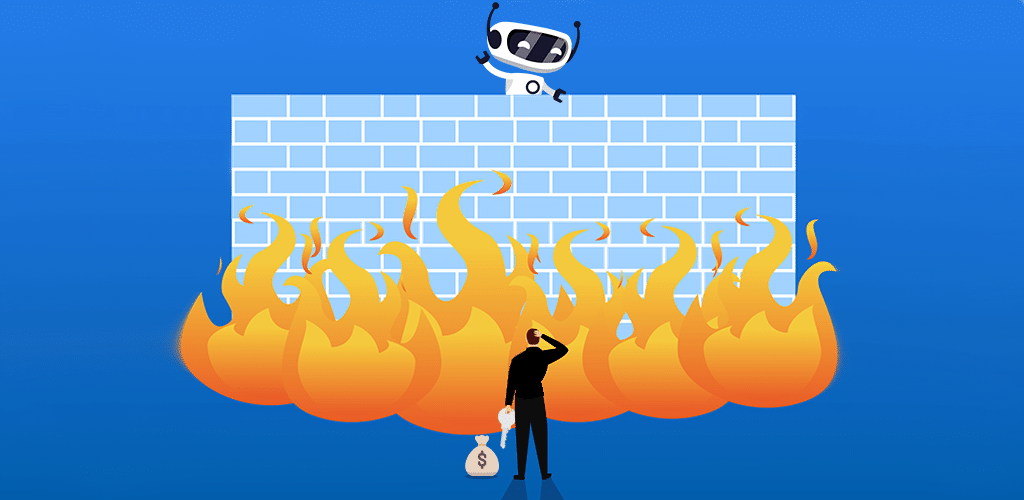January 2, 2020
A Brief Explanation of Firewalls
Posted by Rhiannon

Untold dangers lurk in corners near and far on the internet. Some of those dangers can attack the devices with which you browse the web. They include viruses, malware, ransomware, and other attacks devised by hackers. Their main goal is stealing your information or money, or simply causing damage to your technology. One of the most effective ways to protect yourself is ensuring your devices have and actively use a firewall. So what are firewalls and how do they work?
- What is a firewall?
- How do they work?
- What are the different types?
- Why should you use a firewall?
What is a Firewall?
A firewall is a piece of cybersecurity technology. It acts as a filter between external web content and the internal device (or, in some cases, the network) you’re using to browse the internet. If the content that it’s filtering is potentially dangerous, the firewall bars it from accessing your device. It helps block threats and prevents hackers from accessing your devices without authorization.
How do Firewalls Work?
Every device that can connect to the internet has a set of “entry points” called ports. A firewall sits in front of the ports as a guard. Every time a piece of data reaches the port, the firewall chooses whether or not to let it through. Its decision is based on a set of pre-determined rules that decide what’s safe and what’s not. A variety of factors dictate those rules. They include your IP address, the web domain you’re visiting, and the permissions of programs on your device.
What are the Types of Firewalls?
In many cases, you may be able to choose which type of firewall you’d like to use. Different versions are better for different uses, such as for individuals or businesses. Take a look at the most popular types:
- Software: A software firewall is one of the most-used varieties of this tool. They’re installed as software (hence the name) onto pieces of internet-connected tech. The purpose of a software firewall is to guard the ports on an individual device against malicious web content. This type of firewall works best for individuals who only need to protect a single device (like a laptop).
- Hardware: Occasionally, people have need of a firewall that protects a range of devices all connected to the same network. A hardware firewall is the best solution. Hardware firewalls come as a physical piece of technology that inspects every bit of data before it even reaches the internet network trying to access it. If the data is deemed unsafe, the hardware firewall blocks it before it comes anywhere near your network or device. This type of firewall is best for businesses because it collectively protects all devices on the network (a software firewall would have to be installed on every device, which requires too much maintenance for most businesses).
- Cloud: A cloud firewall is one that uses a cloud server to protect all devices connected to that server. This is a less conventional option than software and hardware firewalls. However, it works well for businesses planning to grow because a cloud firewall is easier to setup and maintain.
Why Should You Use a Firewall?
As mentioned earlier, a firewall is a crucial tool for maintaining your cybersecurity. They prevent malicious data from affecting your devices and networks. If that’s not enough to convince you, here are some other benefits of regularly using a firewall:
- Prevent Malicious Downloads: If you’ve ever downloaded content from an unknown source on the web, be it a photo, video, game or other media, you can thank your firewall for ensuring that the content didn’t come attached with a virus, malware, or ransomware. These types of content, when mistakenly downloaded to a device, can lead to the device breaking, being filled with ads you can’t get rid of, or being locked out until you pay money to get back into the device.
- Prevent Unauthorized Access: In some cases, a hacker may be able to gain entry to your device which allows them to use the device for their own purposes. This could result in illegal activities being conducted from your device, or in the loss of your private data. A firewall is able to prevent unauthorized access.
- Make Online Gaming Safer: Online gaming is incredibly popular, with millions of people participating in hundreds of games around the world. Although game security has increased drastically over the years, there is still some slight risk that a hacker can sneak malware into your system through an online game. A firewall can prevent that.
- Block Content: If you share a device with other users and don’t want them accessing certain kinds of content (for example, blocking children from accidentally opening adult content), a firewall has the ability to block specific locations online.
To protect yourself further, browse the web privately and safely with HotBot.com.
Posted by Rhiannon
More Blog Posts
February 14, 2023
How the Investigatory Powers Act Impacts Citizen Privacy
In 2016, the United Kingdom passed the Investigatory Powers Act or IP Act, into law. This act empowered the government and related agencies to access and collect citizen data, without consent. Critics immediately slammed the new law. The media dubbed it the “Snoopers’ Charter.” Meanwhile, Edward Snowden described the act as “the most extreme surveillance […] Read moreFebruary 14, 2023
Unblock Instagram Instantly with HotBot VPN
Photographers, foodies, and models alike all love Instagram for its ability to quickly and easily share beautiful photos with wide audiences. However, networks sometimes block the app in schools, workplaces, and regions for its ability to act as a distraction. Unblock Instagram as quickly and easily as you can share your latest selfie by using […] Read moreFebruary 14, 2023

